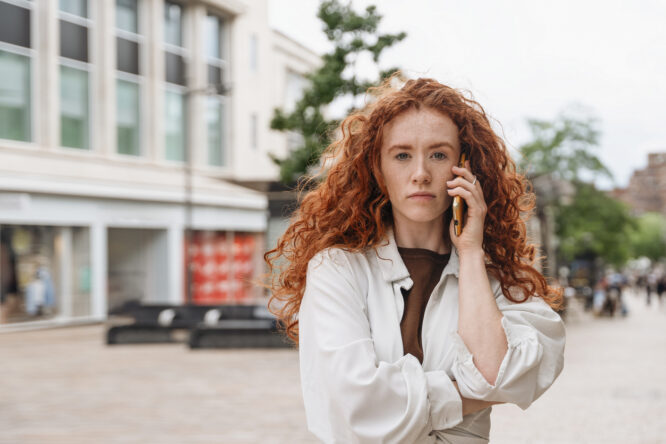Just because someone says sorry for something they did wrong doesn’t mean everything’s fine.

And yet, a lot of us feel pressure to say everything’s forgiven and move on, even when it’s really not, and we’re not ready to let it go. Whether the apology felt forced, too late, or didn’t even touch the real issue, you’re allowed to respond in a way that feels honest. You don’t have to be cruel, but you don’t have to fake forgiveness, either. Here are some solid ways to reply to an apology when you’re still not okay with what happened.
1. “Thanks for the apology, but I’m still working through it.”

This keeps things respectful, but real. You’re not brushing their apology off, but you’re also not pretending you’re over it just to keep things smooth. It gives you space to process at your own pace. People often want quick forgiveness so they can stop feeling uncomfortable. But healing doesn’t work like that. You’re allowed to take your time, and this sentence sets that tone without escalating the situation.
2. “I hear you, but it’s going to take some time to rebuild trust.”

This one’s useful when the apology sounds sincere, but you’re still feeling cautious. Maybe they’ve hurt you before. Maybe the damage ran deep. Either way, this response makes it clear that an apology is a start, not a finish line. It also puts the focus where it belongs: on rebuilding, not just on saying the right words. If someone truly wants to make things right, they won’t rush you. They’ll show up consistently over time.
3. “I’m not ready to talk about forgiveness yet.”

There’s nothing wrong with not being ready. Sometimes people say sorry too soon, before you’ve even caught your breath. If you’re still hurt, still angry, or still figuring out how you feel, you don’t owe them a quick resolution. This sentence lets them know the door’s not slammed shut, but you’re not going to fake closure just to make them feel better. It’s firm, but not cruel. And most importantly, it’s honest.
4. “I appreciate that, but the impact is still there.”

This one’s helpful when someone apologises but doesn’t really grasp the weight of what they did. Maybe they’re focused on feeling guilty, but you’re still dealing with the aftermath. You’re letting them know that while the apology is noted, the harm didn’t magically disappear. You’re not being cold; you’re being clear. It’s a way of saying, “I heard you, but I’m still carrying this,” and it gives them the chance to step up, not just step back.
5. “That doesn’t fix what happened, but I needed to hear it.”

Some apologies are too little, too late, but they still matter. Maybe they don’t change anything practical, but they acknowledge something that should’ve been acknowledged a long time ago. This response gives room for both: appreciation and honesty. It tells the person you’re glad they owned it, but you’re not suddenly fine now. It keeps the dynamic grounded in reality, not false closure.
6. “I’m glad you’re taking responsibility, but I’m not ready to move on yet.”

This one’s about separating responsibility from resolution. Just because someone finally took accountability doesn’t mean you’re ready to pick up where things left off. You can appreciate their effort and still honour your own emotional timeline. It’s especially useful in relationships where you’ve been asked to move on too quickly in the past. It draws a boundary without dismissing their effort to do better.
7. “I get that you feel bad, but it’s not my responsibility to make you feel better.”

Sometimes, apologies aren’t really about the person who was hurt. Instead, they’re about clearing the conscience of the person who caused the harm. This sentence puts the focus back where it belongs: on what you need, not just on their relief. It’s not about rubbing it in. It’s about reminding them that saying sorry doesn’t mean the emotional work is over. If they’re genuinely sorry, they’ll be able to sit with the discomfort too.
8. “I’ve heard this before. What’s different this time?”

If someone has a habit of apologising without changing, this response puts the spotlight on action. You’re not here for another round of “I’m sorry”; you want to see proof that something’s actually changed. It’s a boundary wrapped in a question. You’re not saying no to the apology, but you are asking for more than words. If they can’t give that, it tells you a lot.
9. “I don’t think we’re ready to move forward yet.”

This is useful when the apology is there, but the repair work hasn’t started. Maybe there’s still tension. Maybe the trust is gone. Either way, this sentence gives the relationship room to breathe, without pretending everything’s back to normal. It’s a pause, not a shutdown, and it tells the other person that if they want things to heal, they’ll need to put in more than just a few nice words.
10. “Thanks for saying that. I’m still upset.”

Sometimes the most powerful thing you can do is be direct. You’re not minimising the apology, but you’re not pretending your feelings have vanished either. It lets both truths exist in the same space: you appreciate the effort, but you’re still hurt. That sort of honesty makes space for a more real connection. If someone can handle you being upset without getting defensive, that’s a good sign. If they can’t, then maybe the apology wasn’t as sincere as it sounded.
11. “I need some time before I decide what’s next.”

If you’re feeling overwhelmed or unsure, you don’t owe anyone a decision right away. This phrase gives you space to figure things out without committing to forgiveness or continuing the relationship before you’re ready. It’s a way of holding your ground while still staying open. Plus, it stops you from being pushed into saying “we’re good” when deep down, you know you’re not.
12. “I don’t think you fully understand why this hurt.”

Sometimes people apologise without really understanding what they did wrong. They might focus on how you reacted instead of what they actually did. This sentence invites them to go deeper, not to make them feel worse, but to help them really get it. It’s not your job to teach them, but if you want to stay connected, this kind of clarity can help. If they’re genuinely sorry, they’ll want to understand, not just get forgiven quickly.
13. “Apology accepted, but the trust needs to be rebuilt.”

This is a good middle ground when you’re open to repairing things but not ready to go back to how things were. You’re not holding a grudge, but you are holding a standard. Trust is earned, not reset with a single sentence. It also sets a clear expectation: if the other person wants the relationship to improve, they’ll need to show it as time goes on, not just once in a moment of guilt.
14. “I can’t pretend this didn’t change how I see things.”

This one’s about naming the impact. Even if the apology was thoughtful, you might still feel like something changed: how you see the person, the relationship, or what you can expect going forward. You can accept the apology and still acknowledge that the hurt left a mark. That honesty matters more than glossing over it.
15. “That doesn’t undo what happened.”

Sometimes the apology is vague, rushed, or just not enough. This line keeps it simple. You’re not angry, per se; you’re just not pretending words can fix something that had real consequences. It’s a quiet way of holding the full weight of the situation. This can be especially helpful if the person is pressuring you to “move on” or act like it was no big deal. You’re reminding them that some things take time, and that their apology doesn’t erase reality.
16. “I’m not ready to forgive you.”

This might be the hardest one to say, but also the most honest. Forgiveness is personal. It takes reflection, healing, and sometimes a level of repair that hasn’t happened yet. You don’t owe forgiveness on demand just because someone said the right thing. This line doesn’t mean you’ll never forgive. It just means it’s not happening right now. And that’s okay. Respecting your own boundaries is part of healing, too.




